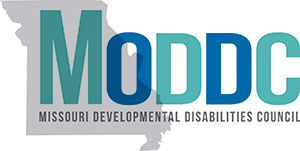Missouri Developmental Disabilities Council's Position Diversity
All groups and organizations in Missouri should care about diversity. Groups should be diverse, just like the people who live here.
Missouri should make rules that protect equal rights for everyone. Missouri should make sure everyone can get the things they need.
Caring about diversity means everyone gets rights, no matter what their background is.
When we say background, we mean things like:
- Disability
- Race
- Ethnicity (where someone comes from)
- Culture
- Age
- Religion
- Gender
- Sexuality (who someone loves)
- Socio-economic status (The amount of money someone has)
It does not matter what someone’s background is. Everyone should be able to use services and get what they need.
Why is diversity important?
Diversity gives everyone a chance to learn from each other. Diversity helps us build off each other’s strengths. Diversity helps us work together to solve problems we all have. Practicing diversity helps make the world better for everyone.
Studies about diversity show that diversity is good too. Diversity helps people learn new things and meet new people. When people from different cultures work together, everyone does better.
Diversity also helps businesses. Companies that care about diversity get more done. They are also better at solving problems and coming up with new ideas. Some studies looked at companies that hired workers with disabilities. Those companies made more money and people had better things to say about them.
Even though there are lots of reasons to care about diversity, many groups still don’t.
The boards of the biggest companies in the U.S. are not very diverse. Only 1 out of 5 of their board members come from underrepresented groups. An underrepresented group means people who get less chances to succeed because of discrimination. For example, people of color and people with disabilities are underrepresented groups. Women are also an underrepresented group. In the biggest U.S. companies, only 1 out of 4 of their board members are women.
People with intellectual and developmental disabilities (I/DD) say they want to be leaders. But they get left out of boards and other leadership positions. And when they do get these roles, they sometimes get ignored or treated like a token.
The United States is a very diverse place. The government needs to be diverse. Companies need to be diverse too.
What should Missouri do?
Missouri must show that we care about diversity. We should spread the word that diverse groups work better together and get more done. Here are some things Missouri can do:
- Missouri should make sure people with I/DD get the help they need. People with I/DD come from all different backgrounds. This means they should be able to get help in different languages. People with disabilities should be able to understand the help they get. And any help should be respectful of their culture, too.
- For example, if somebody speaks Spanish, they should be able to get help in Spanish.
- If someone has a hard time reading, they should be able to get help in other ways. This might mean having someone talk to them instead. Or it could mean getting materials that are easier to read.
- People of all backgrounds should have the same rights. They should get treated the same, and have the same chances to succeed. Missouri should pass laws to make sure of this.
- The government of Missouri should be as diverse as the people who live here. The Missouri state government should think about this when it hires people.
- For example, half of the people who live in Missouri are women. So, half of the people who work in the government should be women, too. One in 4 Missourians has a disability. So, 1 in 4 government jobs should be held by people with disabilities.
- Missouri has many supports, services, and opportunities for the people who live here. But not everyone who can use them gets a chance to. Missouri should talk to people from different backgrounds about these programs. Missouri should use what they learn from these talks to make the programs better.
- Missouri should make sure the groups they work with care about diversity. Missouri should make sure businesses and organizations don’t leave people out because of their background. Missouri should make sure the products and services these groups make work well for everyone.

